Interactive social play entitled “ Situation ” Report
An interactive play entitled “A Situation” was held on Saturday, June 29, 2019 at the Basement Cultural Foundation, which discussed various of socially controversial issues within the Foundation’s “Alternative Views” project.
Khalid Al-Muraisi, Project Manager at Basement Foundation, presented an overview of the Alternative Views project, in which 60 young men and women discussed – at an earlier stage – different issues from different perspectives. These visions were then transformed into works of artworks, including a plastic art exhibition and an interactive play, to engage young artists to reflect the selected issues community issues into artworks.
Subsequently, the artist Nizar Al-Sanafani gave an introduction about the concept of the interactive theatres, which is based on the involvement of the public in the discussion of the issue covered by the play, to propose solutions, to participate in making change in the scenarios, features of this type of theater performances reduce the gaps between the audience and theater.
The play received notable interaction from the attendees who participated with their opinion on the raised issues, and some of the audience participated in the representation to offer different visions of these issues.
The play was directed by Waddah al-Ra’i, who participated in the tournament alongside Saleh al-Asmar, Suad al-Yousifi and Abdulwahab al-Jaifi. The script was written: Waddah al-Ra’i, and Abdo Salem. The interactive theater was moderated by artist Nizar Al-Sanfani.
The first part of the play was a dialogue between an old man and his grandchildren, dealing with the gap between the old and new generations, its economic and social aspects, the effects of technological advancement and the Internet, university study, qat consumption, youth migration, and other topics. The audience then interacted by presenting opinions first, then participating by choosing roles in the play to propose alternative solutions.
One of the audience, Aklan Al-Sabri talked about the issue of the generation gap, and stated that technological progress has widened the difference between the two generations, and stressed that there are negative and positive aspects in both generations. This is what was agreed by Majd Al-Dahmashi, who added that each generation has something to distinguish without favoring one over the other. While Mohammed Al-Thawr said that the conditions and technological advances experienced by the new generation were what made it different, why should women, for example, make a great effort in domestic work if they were able to use advanced production to perform easily?
Narjis Abbad commented on the same issue, stating that we should not give up our nostalgia, and it is useful to take positive behaviors and lifestyles from a generation to another.
Jawad al-Awadi participated in the representation, and chose the role of the father who stands in a middle position between grandfather and grandchildren, and stressed that there are constants that do not change over time, such as beliefs and ethics, while there are variables such as appearance and lifestyle. Every generation tries to change something in the previous generation. Even the ancestral generation rebelled against the previous generation.
Participating from the audience was Ferial Magdy, taking the role of a mother, choosing the issue of using social media, and its impact on the new generation, which became preoccupied with them all the time neglecting other important aspects of his life. Ferial stressed that these means have become a reality that we cannot change or ignore, but the solution lies in rationalizing its use, by organizing time, and giving everything its right.
Mr. Abdulwasea Al-Adoumi took part in the role of father, and spoke about the need to accept technological and scientific advances, but stressed that the world has changed because of respect for the system and time, and as we have to adapt to technical progress and the spread of social media, we also have to respect time and exploit it to the benefit
The second part of the play deals with the issue of women working in unusual occupations. The actress appeared in the role of a restaurant worker who hears different opinions about her work in a career that was restricted to men in the past.
After the end of the play, Amr Al-Hudhaifi talked about the different reactions that may be faced by breaking down societal barriers. There are always victims at the beginning of each change. Breaking the habit requires strength, courage and a strong motivation. Amr pointed to the Yemeni and Islamic history in which this distinction did not appear for men and women.
Abdel-Qawi Hassan wondered how we could change our negative perception of women’s work.History shows that women have proven themselves in strong business.They have ruled the markets and participated in battles, and women have only despised the exotic culture that they see as just a commodity.
Sarah Abdel Karim stated that we need to change our society’s perception of women, not just allowing them to break the taboo, and pointed out that a large number of girls in our country are still deprived of even education.
Nabil Kassem said that the work of women is not a decision sometimes, but a circumstance imposed, and the conviction of others is not necessary, it will work and continue its way in any case.
Amani al-Habashi pointed to those who view women as an entity linked to others, and not seen as an independent personality, and a stand-alone entity. Women in Yemen would one day prove themselves.
Asaad Kamel had a different opinion. He saw that there were professions specially for men and for women, and women should work in the place that suits them so as not to be harmed. Some employers exploit women’s work to attract customers.
Haifa Abdel Wahed said that women are helping to raise the economic level of their family and country in any work, even though they suffer from the inferior view.
Sara Al-Afif asked who decides whether the profession is suitable for women. She noted a stage where women were even deprived of voting, but they proved themselves and their merit. She emphasized that women were able to work in any field. It works not only because of material need, but because it has the right to work.
Jihad Babrik sent a letter to the woman asking her to learn how to defend herself when she decides to work in a socially unacceptable profession and to always put herself in respect.
Haifa Abdel Wahed said that women are helping to raise the economic level of their family and country in any work, even though they suffer from the inferior view.
Sara Al-Afif asked who decides whether the profession is suitable for women. She noted a stage where women were even deprived of voting, but they proved themselves and their merit. She emphasized that women were able to work in any field. It works not only because of material need, but because it has the right to work.
Jihad Babrik sent a letter to the woman asking her to learn how to defend herself when she decides to work in a socially unacceptable profession and to always put herself in respect.
Asaad Al-Kamel, who acted as a client in a restaurant where a woman works, participated in a discussion with other actors, expressing his opinion about the work of women, who should not work in a place where they are abused and ill-treated.
Nargis Abbad acted as the owner of the restaurant where the girl worked, defended her when she was abused, expelled her molesters, and then asked the girl to prove her character and learn how to defend herself strongly.
This play was the first interactive play organized by the Cultural Foundation , and had a significant impact on the interaction and participation of the public with Alternative views on the issues at hand.

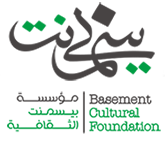
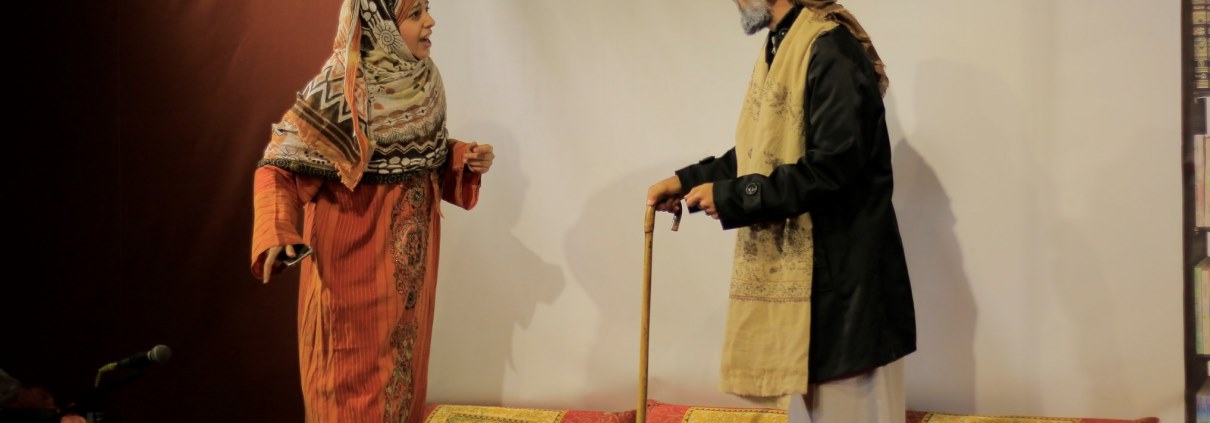
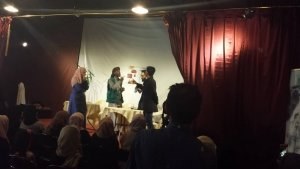
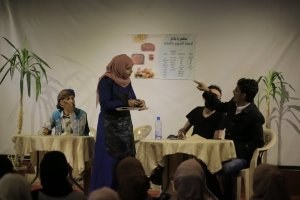
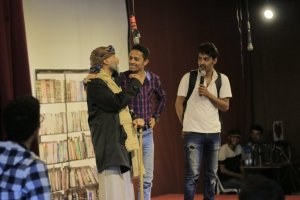
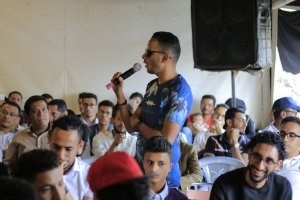
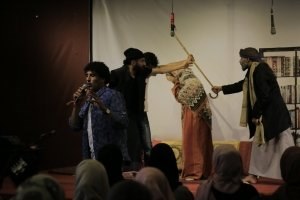
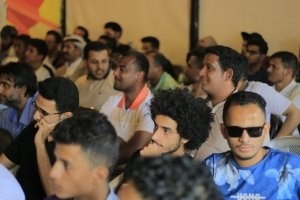
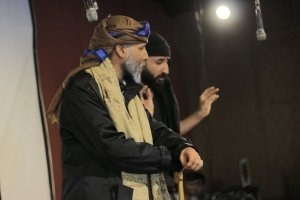
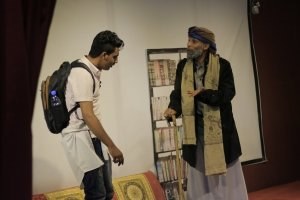
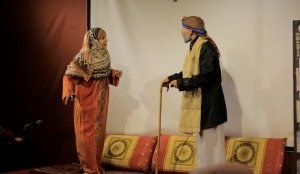
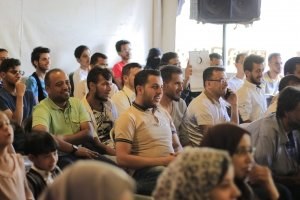
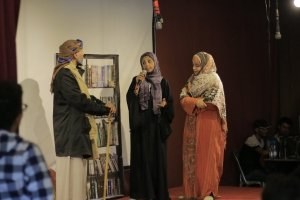
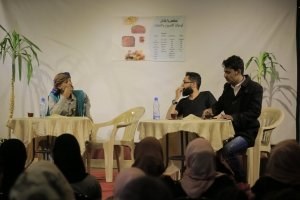
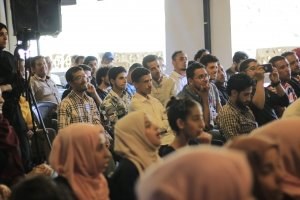
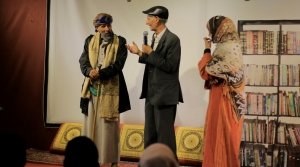
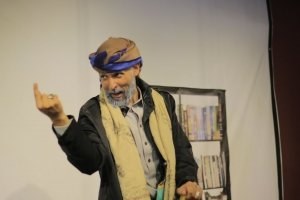
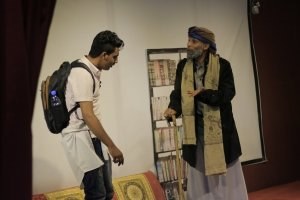


Leave a Reply
Want to join the discussion?Feel free to contribute!